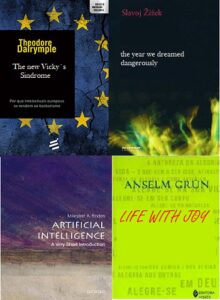
Arquivo para December 27th, 2022
Reflections for 2023
I always make a proposal for some readings at the end of the year, sometimes I abandon some and always attach others, due to the duty of the teaching profession and the emergence of new facts, as was the case of the pandemic in 2020 and the war in Ukraine in the last year.
I abandon some and always attach others, due to the duty of the teaching profession and the emergence of new facts, as was the case of the pandemic in 2020 and the war in Ukraine in the last year.
Among others, four books already ordered, which I intend to read in the year 2023 are: “The new Vicky syndrome: why European intellectuals surrender to barbarism” by Theodore Dalrymple (pseudonym of British physician, psychiatrist and essayist Anthony Daniels, 72). years), although 2016 had several successes of the conjuncture, the second book is by Slavov Zizek: “The year we dream dangerously” (2012), the third is about technology, many bizarre things are written about technology and its advances, since we quote Jean Michel Ganascia: “The Myth of the singularity”, now we want to reread Artificial Intelligence from the author of the area but on basic things and on the dilemmas of AI: “Artificial intelligence: a very brief introduction”, basic but knowledgeable of the subject, a deeper reading requires study and specialization in the area.
A book of a spiritual nature could not be missing from the list, the book by Anselm Grum, who is a 77-year-old German Benedictine monk, and many of his books have had an impact on different situations, and now he wants to respond to anxiety, depression and hopelessness that affects a large part of pandemic humanity.
From Dalrymple we already posted about the book “Our culture or what we made of it” where the cultural analysis precedes the economic one and converges with the social one, about Slavov Zikek we had some quotations and we already have some reflections on his updated vision of socialism, but whose aspect of violence is not discarded.
In Zizek’s view, the overcoming of the social state or the welfare state, the state today is the administration of a permanent social crisis, and in this book still to be read, the releases and readings allowed online that I could read, he reveals the appreciation of intellectuals (I would say especially of the current editorial groups and their narratives) for the catastrophe, and I would say in disagreement with Zizek that he is also in this process, only due to the aspect of the use of violence expressed in several of his books, the indicated however shows the renewing aspect and true change that these movements of the 2011 were marked, but they were consumed by the current culture.
Although he has this ideological disagreement with Zizek, his analysis of 2011 should be quite interesting, remember the Arab Spring, the occupation movements like “Occupy Wall Street”, in Tahrir Square, in London and in Athens, there were strong movements, there were dark dreams, and certainly an event that Zizek does not remember, but it is important: the Fukushima catastrophe, the nuclear problem, was on March 11, 2011.
AI have much literature with little foundation ventures into the area, where the biggest problem is neither mystification nor ethical problems, but knowledge of the basic elements and future possibilities of the area, specialist Margaret A. Boden who researches in the area and understands the doubts on the subject, makes a very brief introduction capable of elucidating lay people already confused by the obscure and critical literature on the issue.
Perhaps there is a lack of frazilian, Latin or African literature, a book that I have seen and I have not formed an opinion is: “Guimarães Rosa: Dimensions of the narrative” catches my attention, I am not aware of the authors Maria Célia Leonel and Edna Maria F. dos Santos, I’m going to research, the synopsis looks interesting when approaching authors like Gèrard Genette and Ernest Cassirer, among others.

